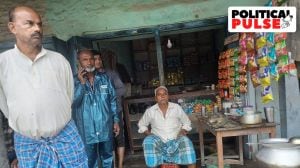Tamil Nadu campaign brings village women to STD clinics
CHENNAI, MAY 3: A few days after the village health nurse (VHN) visited their homes and enlightened them on sexually transmitted diseases...

CHENNAI, MAY 3: A few days after the village health nurse (VHN) visited their homes and enlightened them on sexually transmitted diseases (STD) and reproductive tract infections (RTI), a 100-odd women arrived at the health sub-centre at Vazhutharety, Villupuram district, about 150 km away from Chennai, for a check-up.
Frail women, with babies on their hips, wait for the medical officer to examine them for suspected STDs and RTIs. There is fear in their eyes and uneasiness in their posture. And justifiably so —- undetected and untreated infections and disorders have taken a toll on these women.
In over a 1,000 health sub-centres, spread across seven districts in Tamil Nadu, thousands of women and a few hundred men, are being examined and treated for STDs and RTIs as part of the family health awareness campaign being held between April 26 and May 5.
The campaign was preceded by intense publicity by way of street plays and posters.
Though the campaign, targetting the 15 to 49 age group is notgender-specific, more men than women are attending the special campaigns. Villupuram Joint Director (health services) Dr C Jayaraman attributes this to more awareness among men and better access to medical care for them, so they in any case seek treatment. “The women are shy and tend to put up with discomfort. Most of these women who have STDs or RTIs must have had severe stomach pain, but would never have approached a doctor. Such camps are widely publicised to attract women.”
The Vazhutharety VHN D Grace explains how she went about meeting men and women in their homes, days before the camp: “In the targeted population, there are 988 men and 1,015 women. Of them, 127 cases of suspected STDs/RTIs were identified, including 113 women. Since we regularly interact with them, we could speak freely to them about white discharge and other syndromes. We then persuaded them to attend the camp, where the doctors do a thorough check-up.”
Each sub-centre team comprises a male and a female doctor, VHN, maleworker and paramedics.
Once the preliminary check-up is done, the infected persons are put on a seven-day treatment course. They are then followed up and referred to the block primary health care centre or nearest government hospital, if need be, for other advanced tests for cervical cancer and HIV/AIDS.
The lack of personal and genital hygiene is stated as the main cause for high incidence of reproductive tract infections among these women. Anaemia and malnutrition are the other causes.
At the Thuravi health sub-centre, though only 61 persons (including six men) were identified during the house-to-house campaign, by midday as many as 102 persons, of whom 70 were women attended the camp. One case of advanced stage of cervical cancer was also referred to the district headquarters hospital.
The sub-centre doctor points out that there was a large underpriveleged population in the village, and their personal hygiene was deplorable. Even among the regular out-patient turnout of 200 people at the PHC, atleast six to seven STD and RTI cases are identified. And most of the cases identified in the camp are new ones, she says.
In the neighbouring Puthamedu hamlet of the 80-odd persons tested, four have been advised an HIV confirmatory test. The novelty of the campaign is that once the cases are identified, the partners are treated simultaneously.
Such a campaign was born out of the startling figures released by the WHO on the burden of STDs in India. According to a baseline study conducted six years ago, 59 per cent of the sex workers were found to have STD. In Chennai, the positivity ranged from 0.8 per cent in industrial workers to 10 per cent in female remand prisoners, and 1.74 per cent among women attending ante-natal clinics.
In Maharashtra, the situation seems much worse, with 92 per cent of all women surveyed, in a cross-sectional study, suffering from some gynaecological condition or another.
The National AIDS Control Organisation (NACO) had decided to integrate STDs and RTIs’ detection andtreatment as part of its programme to be implemented by each State AIDS cell. It has been found that those with these conditions had an increased chance of being infected with HIV. The new DANIDA-funded reproductive and child health project will also be focussing on these issues.
To flag off the integration process, NACO identified certain districts with high incidence of such conditions to conduct a pilot study, which also includes this special campaign.



- 01
- 02
- 03
- 04
- 05




























